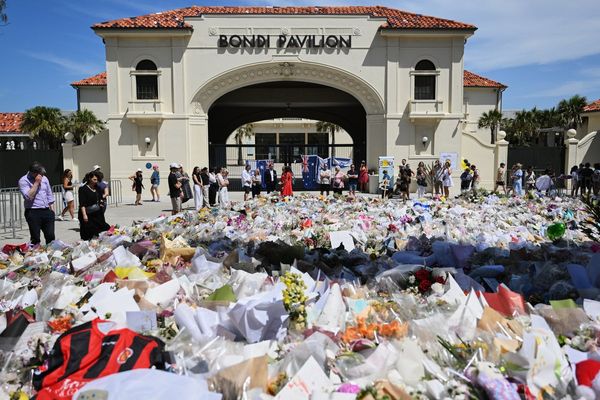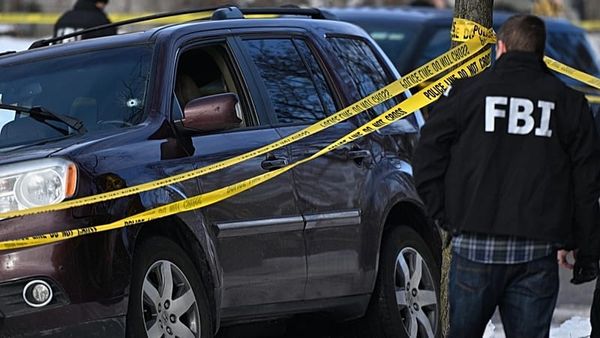
For anyone who thought David Fincher’s last film, Mank, was the beginning of a new highbrow phase for the director, his latest offering will be something of a jolt. Whereas Mank – on the writing of Orson Welles’ Citizen Kane – was a sumptuous, substantial, awards-friendly hymn to old Hollywood (it was nominated for 10 Oscars and won two), his new film, The Killer, is a pulpy, violent, almost wilfully two-dimensional hitman thriller adapted from a comic book. “I will never be a more mature film-maker. I will carry the 12-year-old me with me wherever I go,” he says proudly.
Rather than growing up, it looks like Fincher is having fun – albeit in a highly controlled, Fincheresque way. He is in a particularly relaxed mode when we meet at a hotel in London. He looks healthy and he is full of wit and energy, almost as if this isn’t the umpteenth interview he has done in his 40-year career.
Despite being one of the most renowned and distinctive film-makers in the business, Fincher is not comfortable with being described as an “auteur”, or even an artist. “There’s this fallacy that film directors come in and explain exactly what it is that they want to see and then they go to their trailer,” he says. “And then it’s presented to them and they make a few revisions, and then it’s trapped in aspic for all eternity. That’s just not it. It’s much more sock puppetry and daycare and plumbing – you know, pouring concrete. It’s a lot more physical labour than people probably imagine.”
Nevertheless, with The Killer, he says: “I just didn’t want to take it quite as seriously.” He describes the film as “like a good B-movie”: lean, gripping and, despite some bone-crunching action, surprisingly funny. Michael Fassbender’s lone‑wolf hitman is almost comical in his fastidiousness, from his defiantly un-Bond dress code (“like a German tourist”), to his reusable folding cup to take on jobs, to his playlist of Smiths songs. But his well-laid plans go off the rails, forcing him to break his own rule: “Anticipate, don’t improvise.”
Might we be seeing a little bit of Fincher himself here? His way of making films is notoriously laborious. He is renowned for his technical finesse, his all-encompassing attention to detail and his reputation for filming many, many takes – up to 100. “There are certain parallels,” he says. “It’s very technical. It’s about getting the shot … I think it’s always interesting to watch somebody use their tools with great precision.” He even micromanaged the subtitling: “I noticed that it said ‘birds chirping’ and I suddenly realised, well, ‘chirping’? What if it’s ‘birds chirp’?” The goal was immediacy and subjectivity, he says, so “you’re literally in this guy’s orbital sockets with him”.
Did he relax his multiple-take ethic a little on this film? “Nope,” he replies. “Listen: I don’t slum. I can’t really work another way. I just feel like time in front of the camera with the actors is what we’re here to do. Everything else is nonsense.”

He is especially full of praise for Tilda Swinton, who has a challenging-looking night-time scene in the snow. “Oh,” he sighs. “We shot probably 26 takes of that. It was really complicated. But she’s so game. It was probably 15 degrees below zero. Her pockets were filled with those little warming things. She was like the Michelin woman.”
As for Fassbender, he has almost abandoned acting in favour of his “first love”: motor racing. He has competed in the 24-hour Le Mans race for the past two years. Fincher caught him at a good time: Fassbender had recently watched Jean-Pierre Melville’s 1967 thriller Le Samouraï. Alain Delon’s methodical hitman is an obvious influence on The Killer. According to Fincher, Fassbender told his agent: “We should do something like that.” It seems like Fassbender was a good fit. “We’re talking about somebody who is precise and also emotionally available,” he says.
Fincher knows that the premise of professional assassins shooting people with sniper rifles and making a clean getaway is fantasy. The Killer was adapted from a French graphic novel series by Alexis “Matz” Nolent: “We were positing a reality that’s not Main Street, but the alleyway behind Main Street.” But he was drawn to the idea of “hiding in plain sight using all of the tools that allow us to be dissociated and disenfranchised”. Fassbender’s unnamed protagonist makes the most of the way digital tech enables us to conduct so much of our lives anonymously – shopping, eating, travelling, banking – without the need to interact with other humans. But, on some level, it was also appealing as sheer entertainment, it seems: “I was interested in the assassin as a tension-delivery device.”

He used to read comic books as a child, he says, although “mostly I was reading American Cinematographer when I was 10”. This was in the 1970s, before the 1980s comics renaissance spearheaded by writers such as Alan Moore and Frank Miller. “By the time Frank Miller was reinventing Batman, I think I’d moved to Hollywood,” Fincher says.
He pitched his idea for a Spider‑Man movie in 1999. Fincher’s version skipped the whole “bitten by a radioactive spider” part and focused on Peter Parker as a grownup. “They weren’t fucking interested,” he says with a laugh. “And I get it. They were like: ‘Why would you want to eviscerate the origin story?’ And I was like: ‘’Cos it’s dumb?’ That origin story means a lot of things to a lot of people, but I looked at it and I was like: ‘A red and blue spider?’ There’s a lot of things I can do in my life and that’s just not one of them.” The gig went to Sam Raimi.
Fincher’s career has always wavered between highbrow and pulpy. He didn’t go to film school, instead cutting his teeth in music videos, for Madonna (Vogue, Express Yourself), George Michael (Freedom! ’90) and Nine Inch Nails (whose members Trent Reznor and Atticus Ross have been regular Fincher collaborators since 2010’s The Social Network and got an Oscar nod for the Mank score). It gave Fincher his technical knowhow and eye for an arresting image.
Since transitioning into features, his choices have been unpredictable, as he is the first to remind me: “How do you put Fight Club and Panic Room back to back?” Or, for that matter, the ill-fated Alien 3 and the superbly gloomy Seven, or the zeitgeisty tech drama The Social Network and a superfluous remake of The Girl With the Dragon Tattoo. He seems to actively resist the “auteur” label with his lack of consistency.
“I’m so bad at that,” he says. “Because a) I don’t care. But b) At the point in time I was making Fight Club, people were saying: ‘How could you?’ And now you make something like The Killer and people go: ‘Why aren’t you doing it like your earlier, more important movies?’ I can’t win.”
But there are some recurring themes in his work, such as troubled, outsider white males. They are often violent (as in The Killer and Fight Club), or at least wilfully anti-establishment (Mank, The Social Network), and sometimes serial killers (Seven, Zodiac and the Netflix series Mindhunter).
“I honestly believe that the high school quarterback who’s dating the homecoming queen cheerleader – even that guy thinks he’s an outsider. Who doesn’t think that they’re an outsider?” he says. “That’s the fundamental difference between me and Tim Burton. Tim Burton believes that Edward Scissorhands is an anomaly. I just don’t know anybody who doesn’t think, in some kind of way, that they’re Edward Scissorhands.”
In terms of modern masculinity, Fight Club is especially significant. Adapted from the 1996 novel by Chuck Palahniuk, its general treatise on the ennui, impending obsolescence and self-pitying grievance of the white American male seems to have anticipated the zeitgeist – and possibly shaped it. As Brad Pitt’s Tyler Durden tells his acolytes: “I see in Fight Club the strongest and smartest men who’ve ever lived. I see all this potential and I see squandering … an entire generation pumping gas, waiting tables; slaves with white collars. Advertising has us chasing cars and clothes, working jobs we hate so we can buy shit we don’t need.”

Fight Club became a key text for a contingent of dissatisfied white men that we might call the “manosphere”: “incels”; neo‑Nazi fitness clubs; the Proud Boys (which the Southern Poverty Law Centre once described as an “‘alt-right’ fight club”); avowed misogynists and male supremacists in the Andrew Tate mould.
“I’m not responsible for how people interpret things,” says Fincher. The Fight Club being consumed by today’s aggrieved manosphere is not the same as the film that flopped on its box office release in 1999, or the one that became a campus hit on DVD, he says: “Language evolves. Symbols evolve.” But it has still become a touchstone for the far right, I suggest. “OK, fine,” he replies, seeming slightly exasperated. “It’s one of many touchstones in their lexicography.”
How does he feel about that? “We didn’t make it for them, but people will see what they’re going to see in a Norman Rockwell painting, or [Picasso’s] Guernica.”
He is implying that it might just be in the eye of the beholder, but Fight Club was overtly tapping into this vein of resentful, disempowered masculinity, wasn’t it? “It’s impossible for me to imagine that people don’t understand that Tyler Durden is a negative influence,” he says. “People who can’t understand that, I don’t know how to respond and I don’t know how to help them.”

If Fincher’s favourite subjects tend to be impassioned, individualistic men (and occasionally women, as in Gone Girl and The Girl With the Dragon Tattoo) who take on one system or another, there is surely an affinity. In 2011, it looked as if Fincher was turning against the system in which he operated. He stepped away from Hollywood film-making and fashioned the first major piece of original content for a DVD mailout company called Netflix. The rest is history, of course. House of Cards became the template for a tsunami of streaming content, with its A-list cast, movie-grade production values and binge-friendly release strategy of putting out all the episodes at once. Streaming’s gain has been mid-budget Hollywood’s loss. Did Fincher see the writing on the wall?
He was still recovering from the box office failure of Zodiac at the time, he explains: “There’s not a lot of plot in Zodiac; it’s much more about the people. What I felt coming out of it was: ‘Maybe a three-hour movie is too much to ask an audience to sit still to watch people.’” He started looking at scripts for the small screen – “not television, but HBO”. In other words, shows of 10 or 12 episodes, rather than 20 or 30. “I started thinking: ‘This is an interesting sandbox to play in.’”
Netflix gave him the keys to the sandbox, so to speak. House of Cards, with Fincher as an executive producer, lasted six seasons. Then came two seasons of his FBI serial killer series Mindhunter (Fincher exec-produced and directed seven episodes). Mank and The Killer were also for Netflix. Fincher is producing much more for it besides, including his adult animation anthology Love, Death & Robots.
Does he feel a bit as if he has killed cinema?
He laughs. “No! No. I think, if nothing else, hopefully what we’ve done is be able to say the fence between a movie story and a longer-term commitment is much lower.”
He insists he is no rebel outsider, raging against the machine: “Much ink is spilled with this idea of me being this sort of terrorist inside the walls, but I’ve never operated with the notion that I’m making something in spite of the people who are paying for it.”
Where will Fincher go next? The Killer’s source comic extends to 15 volumes, so there is the possibility of a sequel, I say – even a franchise. “One would think,” he responds. “I’ve given up on trying to predict what people want.” If any of his movies deserves a sequel, it is surely The Social Network, given all that has happened with Zuckerberg, Facebook and Meta since. His reply is cryptic: “Aaron [Sorkin, who wrote the film] and I have talked about it, but, um … that’s a can of worms.”
If he has any idea what his plans are, he is not letting on, but there is every possibility that he doesn’t. “I never know where I’m headed,” he says. “And I like being lost.”
• The Killer is in UK and US cinemas from 27 October and on Netflix from 10 November







